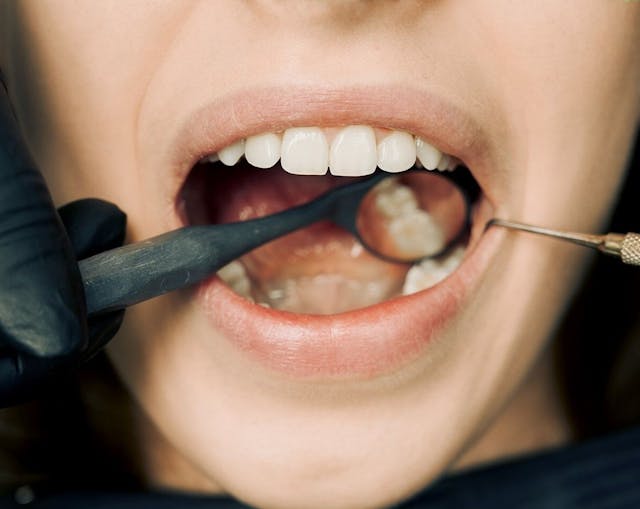Introduction:
Many individuals share the goal of possessing a bright and healthy smile. Achieving this requires prioritizing dental cleaning to ensure optimal oral health and brightness. However, concerns often arise “Is Dental Cleaning Safe?“. In this comprehensive guide, we delve into the intricacies of dental cleaning to dispel myths and provide a thorough understanding of its safety and importance in preserving oral health.
Understanding Dental Cleaning:
Dental cleaning, also known as Oral Prophylaxis, is a routine procedure performed by dental professionals to remove plaque, tartar, and stains from the teeth. Contrary to common misconceptions, dental cleanings are not only safe but also integral to preventive dentistry. By meticulously eliminating harmful bacteria and deposits from the teeth, dental cleanings play a pivotal role in preventing cavities, gum disease, and other oral health issues.
Ensuring Safety: The safety of dental cleaning is paramount and is ensured through various measures:
- Professional Expertise: Dental cleanings are conducted by trained professionals, including dental hygienists and dentists, who possess the necessary skills and expertise to perform the procedure safely.
- Sterilization and Sanitization: Dental instruments and equipment undergo rigorous sterilization and sanitization protocols to prevent the spread of infections and ensure a hygienic environment.
- Patient Evaluation: Prior to performing a dental cleaning, patients undergo a comprehensive evaluation to assess their oral health status and identify any underlying conditions or concerns that may affect the procedure’s safety.
- Patient Comfort: Measures are taken to ensure patient comfort during dental cleanings, including the use of numbing agents and accommodating individual needs and preferences.
Dispelling Common Myths About Dental Cleaning:
Despite the safety measures in place, misconceptions surrounding dental cleaning persist. Let’s address some common myths:
- Enamel Damage: There is a misconception that dental cleaning can damage tooth enamel. However, when performed correctly, dental cleaning poses minimal risk of enamel damage. Dental professionals utilize specialized tools and techniques to safely remove plaque and tartar without harming the enamel.
- Discomfort: While some individuals may experience mild discomfort or sensitivity during dental cleanings, this is typically transient and manageable. Dental professionals strive to ensure patient comfort by employing techniques such as topical numbing agents and gentle handling.
- Risk of Infection: Concerns about the risk of infection during dental cleanings are unfounded. Strict infection control protocols are followed to minimize the risk of cross-contamination and ensure a safe treatment environment for patients.
The Importance of Regular Dental Cleanings:
Beyond safety considerations, regular dental cleanings offer a multitude of benefits for oral health:
- Prevention of Dental Problems: By removing plaque and tartar buildup, dental cleanings help prevent the onset and progression of cavities, gum disease, and other oral health issues.
- Early Detection of Oral Health Issues: Dental cleanings provide an opportunity for dental professionals to detect oral health issues early, allowing for prompt intervention and treatment.
- Improved Oral Hygiene: Dental cleanings complement regular brushing and flossing by providing a thorough cleaning of hard-to-reach areas and promoting optimal oral hygiene.
- Enhanced Aesthetics: A clean and healthy smile not only contributes to oral health but also enhances aesthetic appeal, boosting confidence and self-esteem.
Tips for good oral hygiene:
Here are some proactive steps you can incorporate into your daily routine to ensure the well-being of your teeth and gums:
- Brush Twice a Day: Make it a habit to brush your teeth thoroughly at least twice a day using fluoride toothpaste. Brushing helps eliminate plaque and bacteria buildup, which are primary contributors to tooth decay and gum disease.
- Floss Daily: Regular flossing is essential for removing food particles and plaque lodged between teeth, areas where brushing alone may not reach effectively. By flossing daily, you can significantly reduce the risk of gum disease and maintain optimal oral hygiene.
- Use Mouthwash: Incorporating mouthwash into your oral care regimen can further enhance dental health by eliminating bacteria in the mouth and refreshing your breath. Opt for a fluoride-containing, alcohol-free mouthwash for comprehensive protection.
- Adopt a Balanced Diet: Consuming a well-balanced diet rich in essential nutrients and low in sugar is crucial for promoting dental health. Nutrient-rich foods support strong teeth and gums while minimizing sugar intake helps prevent tooth decay and gum issues.
- Limit Sugary Intake: Sugary foods and beverages are notorious for fostering dental problems, including cavities and gum disease. Be mindful of your consumption of sugary treats and drinks, opting for healthier alternatives like water or milk whenever possible.
- Regular Dental Visits: Consistent visits dental checkups and cleanings is vital for preventive care. These routine appointments enable your dentist to monitor your oral health, address any upcomming issues promptly, and provide professional cleanings to remove hard plaque and tartar buildup.
Conclusion: In conclusion, dental cleaning is not only safe but also essential for maintaining optimal oral health. By dispelling myths and providing insights into the safety measures and benefits of dental cleanings, we hope to empower individuals to prioritize their oral hygiene without hesitation. Remember, regular dental cleanings are a cornerstone of preventive dentistry, ensuring a lifetime of smiles and oral well-being. Schedule your next dental cleaning today and embark on the journey to a brighter and healthier smile!
Also Read:

